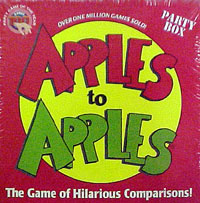Apples to Apples
| "The Game of Hilarious Comparisons!" | |
|---|---|
 The cover of the Apples to Apples Party Box | |
| Publishers | Pegasus Spiele, Out of the Box, Mattel |
| Players | 4–10 |
| Setup time | 1 minute |
| Playing time | 30–75 minutes |
| Chance | Medium |
| Age range | 12 and up |
| Skills | Social skills |
Apples to Apples is a party game originally published by Out of the Box Publishing, and now published by Mattel. The object of the game is to win the most rounds by playing a "red apple" card (which generally features a noun) from one's hand to best "match" that round's communal "green apple" card (which contains an adjective) as chosen by that round's judging player. The game is designed for four to ten players and played for 30–75 minutes.
Apples to Apples was chosen by Mensa International in 1999 as a "Mensa Select" prizewinner, an award given to five games each year.[1] It was also named "Party Game of the Year" in the December 1999 issue of Games magazine[2] and received the National Parenting Center's seal of approval in May 1999.[3] The popularity of the game led to an increased interest in similar card-matching/answer-judging party games.
Rules
Each player is dealt Seven "red apple" cards to make up their starting hand. On each card is printed a noun or noun phrase (both proper and common nouns are used), or occasionally a gerund. In previous versions of the game, the game is played with hands of seven red cards instead of five.
The game is played in rounds with one player acting as the "judge" in each round. The judge for the round draws a "green apple" card on which is printed an adjective ("scary", "frivolous", "patriotic", etc.), and places it face-up on the table for everybody to see. Then each player other than the judge chooses a red apple card from their hand that they think is the best "match" for the chosen green apple card, and places it face-down. The judge shuffles the red apple cards, reads them aloud. Without the players revealing which red card is theirs, the judge decides which is the "best match" for the green apple card.
The player who submitted the chosen red apple card wins the round, and takes the green apple card to signify their win. All players then draw a get red apple card to replace the one played in the previous round. The role of "judge" may pass to another person (generally passing to the next player to the left, though some rules have the round's winner becoming the next "judge"). Some editions of the game suggest automatically rejecting the last redcard played in each round from consideration, to encourage players to play their cards more quickly.
The winner of the game is the first player to accumulate four green cards (or alternatively, the player with the most green cards after a set number of rounds).
Variations
The game's structure is very flexible and affords for an array of possibilities for custom rules. The official rules suggest a series of these alternate rules to add variety to the gameplay:
- Apple Potpourri: The red cards are selected by each player in hope they will match a green card which is revealed after the red cards are played.
- Apple Traders: On each turn, after drawing a new seventh card, each player selects one red card from their hand to pass to the player on their left.
- Apple Turnovers: The roles of red and green cards are reversed, with players using adjectives to describe the given noun. This can be stymied by the relatively low number of green cards in the game.
- Apples Eye View: The judge must pick a red card based upon the point of view of somebody or something else (e.g. a house cat, Rush Limbaugh, a speck of dust, etc.). The player to the left of the judge determines what point of view the judge must use for that round.
- Baked Apples: After each player plays one card, the judge lays them face up and, instead of announcing the winner, identifies the non-winning cards first, each time explaining why it was not selected. The role of judge passes on to the winner of each round.
- Big Apples: Two or more players boasting that the judge will pick their card can agree to each wager one of their already-won green cards. If the judge does not pick one of their red apple cards, the wagered cards are forfeited to the bottom of the card stack.
- Crab Apples: The winner is the red card which least matches the green card (i.e. the most unlike that adjective).
- 2 for 1 Apples: The judge turns over two green cards to start the round. Each player selects the red card from his or her hand that is best described by both green cards. The winner gets both green apple cards.
- Infinite Apples: Rather than playing to a set number of green cards, play stops whenever the players feel like stopping. The winner is the one with the greatest number of green cards.
- Apple Timers: Rather than playing to a set number of green cards, play stops when a certain time limit has been reached. This is sometimes coupled with time limits on each round, for both playing red cards and for judging. The winner is the player with the most green cards.
Game versions

The original boxed set contained:
- 108 green cards (green apples) each of which has an adjective printed on one side.
- 324 red cards (red apples) each of which has a noun printed on one side.
- A tray for holding the cards.
Four expansion sets were available adding 72 extra green apple cards and 216 extra red apple cards each. In 2002, Expansion Set 3 won the Origins Award for Best Card Game Expansion or Supplement of 2002.
As of 2005[update], the original set and its expansions have been retired and replaced by a Party Box with the combined contents of the basic set and its first two expansions, and Party Box Expansion 1 set with the combined contents of the third and fourth expansions, and a Party Box Expansion 2, which contains new cards.
On September 8, 2007, Out of the Box Publishing sold the rights for Apples to Apples to Mattel.[4]
Official distributions
This section needs additional citations for verification. (February 2012) |
Below is a list of currently available distributions of Apples to Apples:
- Party Box - a combination of the original game and the first two "Expansion Sets"
- Party Crate - a premium version of the Party Box a wooden box packaging.
- Party Box Expansion One - a combination of the original "Expansion Sets" 3 and 4
- Party Box Expansion Two
- Junior
- Kids
- Bible Edition
- Jewish Edition
- Junior Jewish Edition
- German Edition
- Yiddish Edition
- Disney Edition
- British Isles Edition
- Spanish edition: Manzanas con manzanas
- To Go - a portable version that includes all new cards.
- Family Edition
- Sour Apples to Apples - a variant in which the judge also chooses a "worst" answer. That player is given a punishment for the next round as determined by an included "spinner". All of the cards in this version are dual-purpose and contain a red half (noun) and green half (adjective) to be used depending on which role the card is used in.
- Big Picture Apples to Apples- a variant in which the red cards are pictures
See also
- Cards Against Humanity – a similar game, but oriented for the adult audience
References
- ^ "Mind Games (select year in menu)". American Mensa Ltd. Retrieved 2008-03-11.
- ^ "Industry News: Apples to Apples Named Party Game of the Year". Pyramid (online). Steve Jackson Games. 1999-10-07.
- ^ "1999 Seal of Approval: Spring 1999 Seal of Approval Product Testing Report". The National Parenting Center. Retrieved 2008-03-11.
- ^ Out Of The Box Publishing

